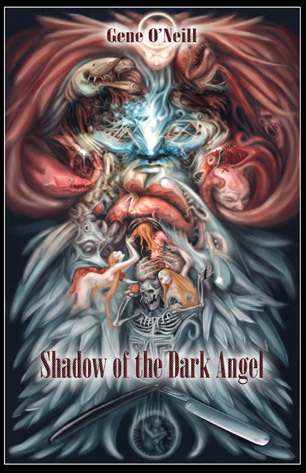 By GENE O’NEILL (Bad Moon Books; 2009)
By GENE O’NEILL (Bad Moon Books; 2009)
Or, SILENCE OF THE LAMBS lite. I’m not sure we really need another serial killer novel, and SHADOW OF THE DARK ANGEL only reinforces my view that this subgenre has long since been done to death by the likes of Shane Stevens, Thomas Harris, Rex Miller, John Sanford, James Patterson, Jeffrey Deaver, Steve Thayer, etc., etc., etc.
If any of those authors sound familiar you’ll know what to expect from this book. Once again we’re introduced to a human monster, hideously abused as a child and now on a misogynistic killing rampage. Once again a determined law enforcement officer—a feisty woman, following in the footsteps of Clarice Starling, KISS THE GIRLS’ Kate McTiernan and THE BONE COLLECTOR’S Amelia Donaghy—is hell-bent on tracking the killer down. Once again it all comes down to a cop-killer mano-a-mano, and an extremely hackneyed one (I wouldn’t dream of revealing who wins).
There are eccentric touches, like the fact that the killer is obsessed with redheaded women’s pubic hair, and driven by a hallucinatory Dark Angel conjured up years earlier by an abusive priest. The unnervingly calm, present-tense prose conveys a sense of lurking menace, especially in the chapters told (in the second person) from the killer’s point of view.
Unfortunately the story fails to deliver upon that menace, playing out in tepid and predictable fashion. The police investigation into the killer’s doings is excessively drawn-out and surprise-free, with a pivotal plot point hinging on the apparently Alzheimer’s afflicted heroine trying to recall something from her past (as it’s a pretty substantial something, her memory is evidently quite poor).
The novel’s ultimate failing, though, is in the killer. A serial killer thriller more than any other sort lives and dies on the merits of its villain, and this novel’s wimpy, pubic hair obsessed laundry worker nutcase is strictly a pretender to the throne of Hannibal Lecter, Francis “Tooth Fairy” Dollarhide, Jame “Buffalo Bill” Gumb and Daniel “Chaingang” Bunkowski. That also goes for the novel as a whole, it being a clumsy reinvention of a wheel that’s already been built, ridden and worn clean.
